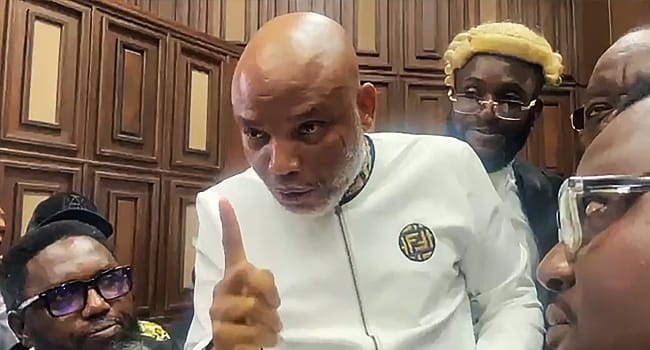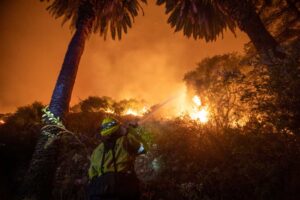After nearly a decade of legal delays, Nigeria’s controversial terrorism trial against Mazi Nnamdi Kanu, leader of the proscribed Indigenous People of Biafra (IPOB), is at a critical turning point. The Federal High Court in Abuja will decide on 10 October 2025 whether Mr Kanu has a case to answer — or should walk free.
The decision could reshape the trajectory of the separatist movement, spark political reactions across Nigeria, and redefine how terrorism-related cases involving political figures are handled in Nigerian courts.
Court Sets October 10 to Rule on Nnamdi Kanu’s No-Case Submission
The Federal High Court in Abuja has scheduled October 10 to deliver a decisive ruling on whether or not Nnamdi Kanu should be discharged from the terrorism charges against him.
The IPOB leader had filed a no-case submission, asking the court to dismiss the charges without requiring him to present a defence. His legal team argued that the prosecution had failed to present credible evidence linking him to any terrorist act.
However, the Nigerian government, through its prosecution team, disagreed — arguing that Mr Kanu must respond to the weight of evidence, including video and audio materials that allegedly show him inciting violence.
What Led to This Point?
Nnamdi Kanu, a prominent pro-Biafra activist, is being tried on charges linked to terrorism and incitement. These charges stem from his public agitation for an independent Biafra, a cause that has drawn international attention and triggered security concerns in southeastern Nigeria.
After the prosecution closed its case in June 2025 — with five witnesses and several digital exhibits — Mr Kanu’s lawyers filed a no-case submission. They claimed none of the evidence directly connected their client to the alleged crimes.
Prosecution: “Kanu Has a Case to Answer”
During the most recent hearing on Friday, government lawyer Adegboyega Awomolo (SAN) urged the court to reject the no-case submission. He insisted that Mr Kanu’s broadcasts encouraged violence and led to the deaths of at least 170 security personnel.
Mr Awomolo said:
“Why should someone who publicly called for the killing of security officers be allowed to walk free?”
He cited video and audio evidence where Mr Kanu allegedly made calls for destruction and encouraged IPOB members to attack state agents. The prosecution believes this clearly violates anti-terrorism laws in Nigeria.
Defence: “Boasting is Not a Crime”
In response, Mr Kanu’s lead counsel, Kanu Agabi (SAN), argued that the defendant’s words were nothing more than political exaggeration — “mere boasting”, not actionable criminal conduct.
Agabi dismissed the prosecution’s evidence, saying:
“He said, ‘I can bring the world to a standstill.’ That’s not terrorism. That’s political speech.”
He challenged the relevance and authenticity of the audio-visual exhibits and also argued that the IPOB proscription lacked presidential approval — rendering it invalid in law.
Agabi also pointed out that:
- The prosecution’s witnesses were mainly SSS officers.
- There was no independent verification of their claims.
- The charges have been amended seven times, yet none identified any person harmed directly by Mr Kanu’s words.
A Timeline of Delays and Legal Turns
- 2015: Nnamdi Kanu was first arrested in Lagos.
- 2017: He was granted bail and later fled Nigeria.
- June 2021: Kanu was re-arrested in Kenya and flown back to Nigeria under controversial circumstances.
- October 2022: The Court of Appeal ruled that Kanu’s extraordinary rendition was illegal and dismissed the charges.
- December 2023: The Supreme Court reversed that ruling, allowing the trial to continue despite the unlawful rendition.
The Supreme Court ruled that although the manner of Kanu’s return was illegal, illegally obtained evidence could still be used in a Nigerian court.
Can the Trial Court Override the Supreme Court?
One of the key questions raised during the Friday hearing was the validity of IPOB’s proscription. Mr Agabi maintained that without presidential approval, the group’s ban is illegal.
However, Mr Awomolo countered that since the issue is pending before the Supreme Court, the trial court cannot revisit or reverse it.
Health and Solitary Confinement Claims
Kanu’s legal team also raised concerns over his mental and physical health. They argued that he has been in solitary confinement for over six years, contrary to international human rights standards, which limit such conditions to 15 days.
Agabi said:
“He is no longer normal because of his confinement.”
What Happens Next?
The October 10 ruling will determine the immediate future of the trial. If the court upholds the no-case submission:
- Kanu will be freed from the current charges.
- The government may appeal the ruling.
If the submission is rejected:
- Kanu will be ordered to open his defence, continuing a legal saga now stretching into its 10th year.
What Nigerians Want to Know
To help readers understand the key issues surrounding this high-profile trial, here are some of the most frequently asked questions:
Q: What is a no-case submission in Nigerian law?
A: A no-case submission is a legal motion made by the defence, asking the court to dismiss charges on the grounds that the prosecution’s evidence is too weak or insufficient to require a defence. It’s like saying, “You haven’t proven anything, so I shouldn’t have to respond.”
Q: Why was Nnamdi Kanu arrested in Kenya?
A: In June 2021, Nigerian authorities re-arrested Mr Kanu in Kenya and flew him back to Nigeria. The process, known as “extraordinary rendition,” was declared illegal by the Court of Appeal but later overlooked by the Supreme Court for the sake of continuing the trial.
Q: Has IPOB been officially banned in Nigeria?
A: Yes, the Nigerian government proscribed IPOB in 2017. However, Kanu’s lawyers argue the ban is invalid because it lacked formal presidential approval, a claim that remains under legal review.
Q: What are the charges against Nnamdi Kanu?
A: He faces several terrorism-related charges, including incitement, unlawful broadcasting, and encouraging violence. The charges have been amended multiple times since 2015.
Q: Why has the case lasted nearly 10 years?
A: Legal delays, changes in defence teams, amended charges, and Kanu’s absence from Nigeria (after he jumped bail in 2017) all contributed to the slow pace of the trial.
Final Thoughts
This case is far more than a legal dispute. It touches on freedom of speech, national security, judicial independence, and the rights of minority groups in Nigeria. October 10 will be a landmark date — not just for Nnamdi Kanu, but for the future of activism, secessionist movements, and how Nigeria treats politically sensitive terrorism charges.
Published by: Afriksblog News Team
Source: Adapted and re-reported from publicly available court updates and official proceedings.




